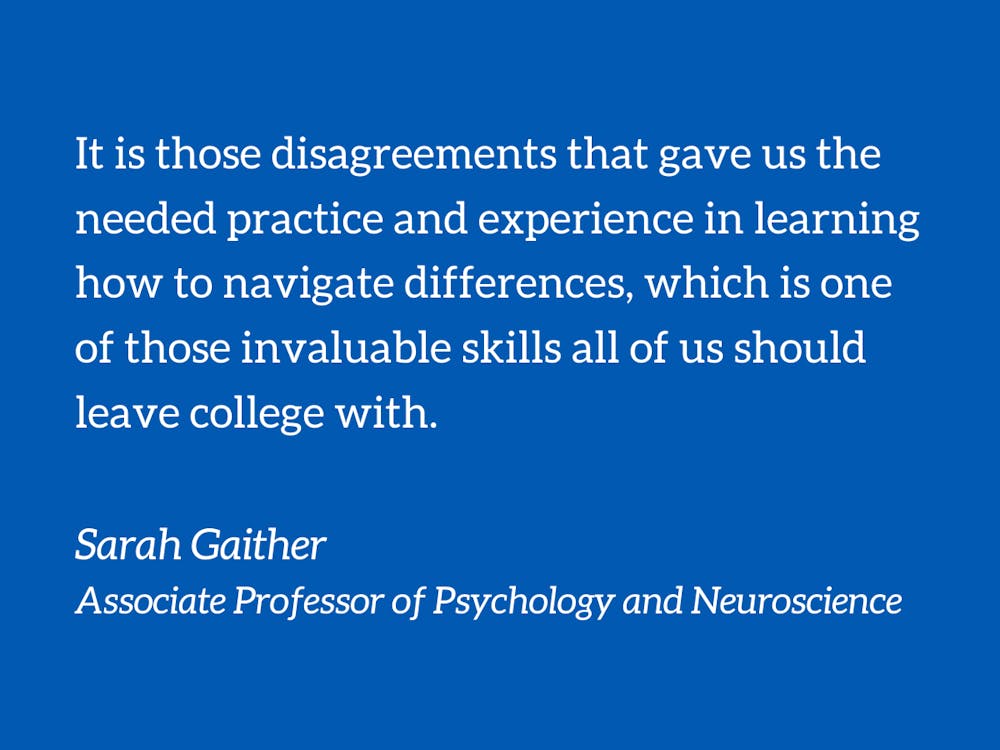I will always remember walking into my freshman dorm on UC Berkeley’s campus — excited and eager to meet my new roommate for the first time. (Remember, this was before Facebook or any social media so I only knew my roommate’s name!)
I walked into my room and my roommate wasn’t there, but her things were all moved in — an organized desk, a neatly made bed with monogrammed blankets, a full-sized Texas state flag hung on the wall and a framed family photo of her with former President George Bush. It was proof that a randomized roommate policy truly was giving me an opportunity to live with someone very different than myself, as a strongly identified Democrat from California.
I was nervous to say the least — what do we talk about? What will she believe? How will I react if she says something I don’t endorse? I was so incredibly focused on how different we might be that it set up my expectations all wrong.
It turns out, she and I had so much in common despite this one difference. And it was those initial conversations that were key in discovering just how much we could learn from each other. You see, this is exactly why randomized roommate policies work — they create opportunities for us to get to know someone new, someone different from ourselves, someone we likely wouldn’t meet otherwise.
Duke is one of many campuses that has recently switched to a randomized roommate policy for first year students. My own college experience, combined with data we collected here at Duke, show that living with someone who is different can diversify our friend networks, expand our senses of self and teach us to think more flexibly.
Although living with my roommate didn’t change my political beliefs or party affiliation, I do think that particular part of my college experience prepared me for living today in a political swing state like North Carolina. It’s true, we definitely experienced some conflict and some disagreements. But it is those disagreements that gave us the needed practice and experience in learning how to navigate differences, which is one of those invaluable skills all of us should leave college with.
I have always said to find comfort in your discomfort, and I promise you that you will learn something about yourself and others by doing this. And this is what the democratic process is all about — people actively participating in the decision-making process where complementary and competing interests are all vying for respect and votes.
This fall marks one of the biggest presidential elections in modern history, combined with a politically charged governor race here in North Carolina. If the work on intergroup contact theory from psychology has shown us anything, it is that positive long-term meaningful, and even indirect, contact with people who are different significantly reduces levels of prejudice. Thus, your college dorm room has the power to reduce bias! Your college dorm room has the potential to create needed opportunities for both listening and dialogue! And even that friend of your roommate has the ability to help teach you something new.
Past research has shown that having equal status (you are both students here at Duke), common goals (wanting to survive college), no intergroup competition (you are part of a bigger Duke or dorm community) and authority sanction (Duke endorses its randomized roommate policy) all leads to higher chances for intergroup contact to succeed in reducing bias.
So this fall, when everyone will be experiencing various levels of stress and anxiety linked to the election, practice democracy by talking to your roommate or someone new on campus. Democracy is defined as power being with the people. Thus, each of you has the power to create connections and to create change, both here on our own campus but also broadly through the act of voting. Even if you can’t vote here in the U.S., I still challenge you to go and learn from others on this campus and elsewhere. This is the beauty of being human and why social connection is essential to our survival.
Dr. Sarah E. Gaither is an Associate Professor in the Department of Psychology and Neuroscience. This piece is part of the “Virtues of Democracy” column, a series of op-eds by faculty and student contributors across Trinity College and the Sanford School of Public Policy. The column typically runs on Tuesdays or Thursdays.
Get The Chronicle straight to your inbox
Sign up for our weekly newsletter. Cancel at any time.

